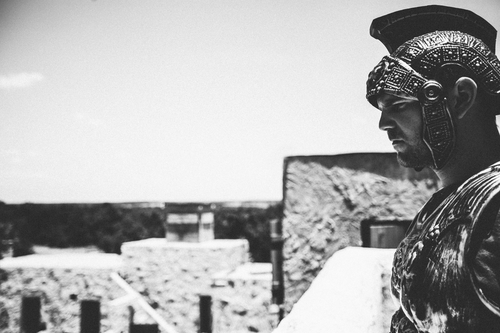“The Helmet of Salvation” – Ephesians 6:16-18 – July 13 2020
/0 Comments/in Enduring Words for Troubled Times/by David GuzikThe Word of Authority
/0 Comments/in For Pastors, Preachers, Bible Teachers/by David GuzikDear Pastor, Preacher, or Bible Teacher –
I have in mind some special people for this brief word. I think of those who have worked hard to bring something from God’s word to God’s people and to all who will listen. Whether you speak to many or to few, you have a privileged place – to speak on behalf of the King of Glory.
With that in mind, think of this from Matthew 8:8:
The centurion answered and said,
“Lord, I am not worthy that You should come under my roof.
But only speak a word, and my servant will be healed.”
When the Roman centurion asked a favor of Jesus, he asked it with great sensitivity towards Jesus. He knew that it was forbidden for an observant Jew to enter a Gentile’s house, so the centurion insisted it was not necessary for Jesus to come to his house. All Jesus had to do was speak a word, and the centurion’s servant would be healed.

The Roman centurion understood something that many people do not: that the healing power of Jesus was not some sort of magic trick that required the magician’s presence. Instead, he knew Jesus had true authority, and Jesus could command things to be done and outside His immediate presence – and they would be done!
The centurion showed great faith in Jesus’ word. He understood that Jesus can heal with His word just as easily as with a touch. The centurion knew that the authority of Jesus was at least as great as the authority of a commanding officer over the soldiers under his charge. When the commanding officer spoke, the soldiers were to respect his authority. When Jesus speaks, He commands authority over every created thing.
Dear friend who labors in the proclamation of God’s word: please remember that there is tremendous authority in the word of God. Your own authority or personality doesn’t really matter much; you are a messenger of the God of all authority! When you clearly explain and apply what God says in His word, you can be as bold as a lion. As you stick to God’s word, you have apostolic authority in the best sense.
Uncertain times call for clear words from our pulpits and places of Bible teaching. This isn’t a season for vain speculations; people need to hear the authority of God’s word. They need to hear it from people who are persuaded that the word of Jesus has authority. I hope you have as much faith in the authority of Jesus’ word as the Roman centurion did!
The authority of Jesus’ word has not weakened one bit in the last 2,000 years. Ask God to give you a fresh appreciation of the authority of the word of God as you present the message of Jesus Christ, the living word.
Blessings to You in Jesus’ Name – David Guzik
Click Here to Receive Email from David for Pastors, Preachers, and Bible Teachers
True and Certain Promises
/1 Comment/in Weekly Devotional/by David GuzikThen the city wall was broken through…. And the king went by way of the plain. But the army of the Chaldeans pursued the king, and they overtook him in the plains of Jericho. All his army was scattered from him. (2 Kings 25:4-5)
As the Bible describes the sad events of the fall of Jerusalem, we can picture them in our mind. We read, “the city wall was broken through” and see Babylonian soldiers pour into the city.
At that point, Zedekiah made a last-chance effort to escape capture. He planned a secret break through the city walls and the siege lines of the Babylonians, sending the remnants of his army one way while he went by the way of the plain.

Zedekiah made it all the way to the plains of Jericho – which was a considerable distance from Jerusalem. Maybe he thought that once he made it that far he was safe, and though the kingdom was lost, he still had his life and freedom. Prophets like Jeremiah promised judgment upon Zedekiah, that he would be captured and punished by the Babylonians. As Zedekiah reached the plains of Jericho, maybe he thought he had escaped the promised judgment.
That’s not how it turned out – they overtook him in the plains of Jericho. In the same region where Israel first set foot on the Promised Land as they crossed the Jordan River in the days of Joshua, the kingly line of David seemed to end. In Joshua’s day Israel saw the walls of Jericho fall; now the walls of Jerusalem were fallen, and the defeat was bitter.
With great cruelty, the Babylonians forced Zedekiah to watch as they murdered his sons – and then gouged out the eyes of the king. The last sight King Zedekiah ever saw was the murder of his own sons.
Through the prophet Ezekiel, God made a strange promise to Zedekiah. God promised that Zedekiah would be caught and taken as a prisoner to Babylon to die there – but he would never see Babylon (Ezekiel 12:13). The strange promise was fulfilled. Zedekiah was caught and taken to Babylon – but since he was blinded on the plains of Jericho, he never saw the land of his exile. The Jewish historian Josephus confirms that Zedekiah was kept in a Babylonian prison until death.
The promise of God’s judgment against Zedekiah was true and certain. That is the nature of God’s promises. However, it is also the nature of God’s more pleasant promises. He promised to never leave or forsake His people (Hebrews 13:5); the promise is certain and true. God promised to forgive our sins when we humble confess them (1 John 1:9); the promise is certain and true.
I could go on and on, but you get the point. The truth and certainty of God’s promises doesn’t have to be bad news for you. In Jesus Christ, it can be the best news. Believe His good and pleasant promises for you today.
Das Wort und der Wille Gottes
/0 Comments/in Wöchentliche Andacht/by David GuzikZedekia war 21 Jahre alt, als er König wurde, und er regierte 11 Jahre in Jerusalem. Und der Name seiner Mutter war Hamutal; [sie war] die Tochter Jeremias von Libna. Und er tat, was böse war in den Augen des Herrn, ganz wie es Jojakim getan hatte. Denn wegen des Zornes des Herrn kam es so weit mit Jerusalem und Juda, bis er sie von seinem Angesicht verwarf. Und Zedekia fiel ab von dem König von Babel. (2. Könige 24,18-20)
Wenn ein Königreich in Chaos und Desaster fällt, ist das nie eine einfache Geschichte. Die letzten Könige von Juda zeigen dies. Der letzte gute König von Juda war Josia, und es gab eine bedeutende Erweckung zu seiner Zeit – aber die reichte nicht aus um die tief verwurzelten Muster der Sünde unter dem Volk zu überwinden.

Nach Josias Tod folgte ihm sein dritter Sohn Joahas auf den Thron, doch seine schlimme Herrschaft war nur kurz. Ihm folgte Jojakim, ein anderer Sohn Josias. Als Jojakim starb wurde sein Sohn Jojachin König – doch nur für drei Monate, dann nahm König Nebukadnezar ihm die Krone weg und setzte sie auf den Kopf von Jojachins Onkel Zedekia.
Ist das nicht alles ziemlich verwirrend? Ja, das ist es. Wieder einmal wendet sich Gottes Volk von Ihm ab und es kommt zu Verwirrung und Chaos. Einer der Gründe, warum Gott will, dass wir Ihm gehorchen ist, dass es unser Leben einfach leichter macht!
Zedekia war ein schlechter König; wir lesen, dass er tat, was böse war in den Augen des Herrn. 2. Chronik 36,11-20 erzählt uns mehr über Zedekia: dass er nicht auf Jeremia oder andere Botschafter Gottes hörte. Zedekia und alle um ihn herum verspotteten und missachteten Gottes Botschaft.
Zedekia lehnte Gottes Wort so sehr ab, und er fiel ab von dem König von Babel. Treue Propheten wie Jeremia warnten ihn vor dem großen Gericht, das Gott sehr bald durch die Armeen Babylons auf sie bringen würde, doch Zedekia wollte nicht hören. Stattdessen hörte er auf die vielen falschen Propheten jener Tage, die Sieg und Triumph predigten. Sie sagten: „Keine Sorge! Gott hat uns schon früher vor den Feinden gerettet, Er wird uns auch vor den Babyloniern retten.“
Das stimmte nicht. Gericht sollte auf Juda und Jerusalem kommen, doch Zedekia war so überzeugt von den falschen Propheten, dass er gegen den König von Babel rebellierte und glaubte, Gott sei mit ihm.
Zedekia lag so falsch. Wir lesen über Juda und Jerusalem, dass Gott sie von seinem Angesicht verwarf. Gottes Geduld hatte schließlich ein Ende, und Er ließ es zu – führte es sogar – dass das König reich Juda erobert wurde.
Viele Menschen machen denselben Fehler wie Zedekia. Anstatt Gottes Warnungen ernst zu nehmen, vertrauen sie auf falsche Propheten, die falsche Versprechungen machen. Die Wahrheit ist, dass Gottes Wille und Sein Wort geschehen wird, und es gibt nichts, was das aufhalten kann. Was wir tun können, ist Buße tun und an Jesus Christus glauben, und uns damit auf die richtige Seite Seines Wortes und Seines Willen zu stellen.
La palabra y la voluntad de Dios
/0 Comments/in Devocional Semanal/by David GuzikDe veintiún años era Sedequías cuando comenzó a reinar, y reinó en Jerusalén once años… E hizo lo malo ante los ojos de Jehová, conforme a todo lo que había hecho Joacim. Vino, pues, la ira de Jehová contra Jerusalén y Judá, hasta que los echó de su presencia. (2 Reyes 24:18-20)
Cuando un reino cae en el caos y el desastre, nunca es una historia simple. Los últimos reyes de Judá lo demuestran. El último rey bueno de Judá se llamaba Josías, y hubo un gran avivamiento en su día, pero no fue suficiente para vencer los patrones profundamente arraigados del pecado presente entre la gente desde los días de los reyes anteriores.

Después de la muerte de Josías, su tercer hijo Joacaz tomó el trono, pero su reinado malvado no duró mucho tiempo. Fue seguido del malvado Joacim, otro hijo de Josías. Cuando murió Joacim, su hijo Joaquín reinó en su lugar, pero duró solo tres meses antes que el rey Nabucodonosor de Babilonia lo quitó del trono de Judá e hizo a su tio Sedequías rey.
¿Suena poco confuso? Lo es. De nuevo, cuando el pueblo de Dios se aleja de Él, la confusión y el caos marcan los tiempos. Una razón por la cual Dios quiere que le obedezcamos y lo honremos es porque generalmente solo hace nuestra vida más simple.
Sedequías fue un rey malvado; leemos que él hizo lo malo ante los ojos de Jehová. 2 Crónicas 36:11-20 nos cuenta más acerca de la maldad de Sedequías, que él no escuchó a Jeremías ni a otros mensajeros de Dios. Sedequías y todos a su alrededor se burlaron e ignoraron el mensaje de Dios.
Sedequías rechazó tanto la palabra del Jehová que se rebeló contra el rey de Babilonia. Los profetas fieles como Jeremías advirtieron sobre el gran juicio de Dios que pronto vendría a través de los ejércitos de Babilonia, pero Sedequías no escuchó. En cambio, le hizo caso a muchos falsos profetas de aquellos días que predicaban un mensaje de victoria y triunfo. Ellos dijeron: “¡No te preocupes! Dios nos ha librado antes de nuestros enemigos, y nos librará de los babilonios”.
No fue cierto. El juicio venía contra Judá y Jerusalén, pero Sedequías estaba tan convencido por los falsos profetas que incluso se rebeló contra el rey de Babilonia, pensando que Dios estaba con él.
Sedequías estaba trágicamente equivocado. Leemos que, con respecto a Judá y Jerusalén, Dios los echó de su presencia. La paciencia de Dios se había agotado y Él permitió, incluso dirigió, la conquista del reino de Judá.
Muchas personas hoy cometen el mismo error que cometió el rey Sedequías. En lugar de escuchar las advertencias de Dios, confían en falsas promesas presentadas por falsos profetas. La verdad es que se hará la voluntad de Dios y no hay nada que podamos hacer para detenerla. Lo que podemos hacer es arrepentirnos y creer en Jesucristo, poniéndonos del lado correcto de su palabra y voluntad.
Haz clic aquí para el comentario de David de 2 Reyes 24





